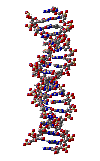|
New light over the role of the hormone progesterone in breast cancer
Breast cancer is the second most common cancer in the world with approximately 1 million of new cases every year, even if the disease tends to have a relatively favourable prognosis. One of the reasons for this is the fact that a majority of breast cancers are hormone-dependent, and treatments blocking these hormones (and consequently cancer progression) can be extremely effective, sometimes even more than chemotherapy.
In fact, ovarian hormones known to play an important role in the development of normal breast tissue - such as oestrogen and progesterone - also seem to be involved in breast cancer development, with 70 to 80% of primary breast tumours showing oestrogen and/or progesterone receptors in their cells. These receptors act as on-off switch; when the right molecule (in this case oestrogen or progesterone) binds to its specific receptor, the switch is turned on, leading, in the case of breast cancer, to disease progression. In result, anti-hormonal therapy (especially anti-oestrogen therapy), which blocks the hormones’ action, is widely used against the disease with good results.
But if oestrogen has been clearly associated with cancer growth, the role of progesterone in breast cancer (and consequently the importance and the specific mechanism of progesterone-blocking therapy) is much less clear.
But now Raquel Soares, Susana Guerreiro and Mónica Botelho from the University of Porto in Portugal found that breast cancer cells that respond to progesterone, produce, when exposed to the hormone, Platelet-derived growth factor A (PDGF-A) a protein known to stimulate cell growth and division. Furhermore, PDGF-A did not seem to act directly on the tumour cells, but was instead released into the space outside of the cell suggesting an effect on neighbouring cells.
Interaction between tumour cells and their environment is crucial for cancer progression and in fact PDGF-A has been suggested to be involved in the formation of new blood vessels (also called angiogenesis). Angiogenesis is a process crucial for cancer sustainability since without new blood vessels around the tumour site to supply nutrients, cancerous cells will starve and die. To test if PDGF-A could be in fact involved in the formation of blood vessels around breast cancer tumour sites, Soares and colleagues decided to analyse smooth muscle cells, which are known to be involved in this process while also have been described as having receptors for PDGF-A. And in fact, PDGF-A (and so progesterone) was found to increase the growth and viability of smooth muscle cells confirming a role to both these molecules supporting angiogenesis.
What Soares and colleagues’ work strongly suggest is that progesterone stimulates cancer development by helping the formation and stability of blood vessels formed adjacent to the tumour cells. These new blood vessels are, not only crucial to the supply of nutrients to cancer cells, but also important “exits” for these cells to spread throughout the body. These results show how current anti-progesterone therapies block cancer progression by targeting not only progesterone-dependent cancer cells but also the formation of new blood vessels, and emphasise the importance of continue to pursue anti-progesterone therapeutics.

1 Journal of Cellular Biochemistry (2006 published ahead of print)“Elucidating Progesterone Effects in Breast Cancer:Cross Talk With PDGF Signaling Pathway in Smooth Muscle Cell”
Authors of the original paper - Raquel Soares - raqsoa@med.up.pt
Link to the original paper –
|
In collaboration with the Observatório da Ciência e do Ensino Superior (OCES)
Financed by the Fundação para a Ciência e Tecnologia (FCT) |





